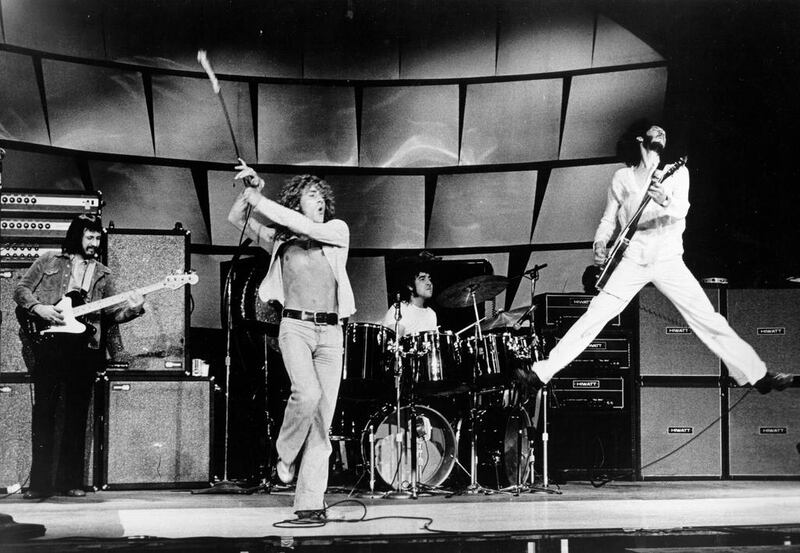It started as an accident. The Who were playing in front of hundreds of frenzied fans at the Railway Hotel in Harrow, west London.
Pete Townshend lifted his guitar high and heard a screeching noise from his instrument. He had pushed the guitar through the ceiling.
In a fit of temper, he again smashed the guitar into the roof and when it was almost destroyed, he held it high above his head – he had performed his first act of what he would call “auto destruction”.
From that moment, in 1964, it was the expected ending of every Who concert – Townshend would smash his guitar, the drummer Keith Moon would kick violently at his drum kit, sending it flying towards the audience, and the singer Roger Daltrey would throw his mic stand across the stage hoping to hit a cymbal or two. Meanwhile, the bass guitarist John Entwistle would just look on, mystified by all the violence taking place.
Just months before Townshend destroyed that first guitar, The Who had changed their name from The Detours. But according to Daltrey, the band weren’t really born until, during a break at a gig, a cheeky little teenager dressed all in ginger walked up to him and said: “I can play drums better than that bloke you have.”
Daltrey decided to let him have a go and after Keith Moon had played so violently – it is said he almost destroyed the drum kit – Daltrey, Townshend and Entwistle knew they had found the final piece in The Who jigsaw. And so the most influential – certainly the loudest, most violent and best live – band in the music world was born.
At the end of 1964 The Who released their first single, I Can't Explain. That was followed by Anyway, Anyhow, Anywhere which, like its predecessor, reached the top 20 of the UK music charts.
Next, Townshend wrote My Generation – the song that not only became their most well known, but a number that contained one of the most memorable lines in rock history: "I hope I die before I get old."
The Who in those days were “a blokes’ band”. Unlike The Beatles and The Rolling Stones, who both enjoyed a large female following, The Who’s audience was predominantly male. Testosterone-filled young men crammed into Who concerts and, inevitably, fights would break out. Townshend, Daltrey and Moon, not averse to a bit of fisticuffs themselves, would sometimes join in.
Despite the acclaim, The Who were still financially poor – having to buy new instruments after every gig may have had something to do with that. Then along came the seminal album Tommy, Townshend's rock opera about a deaf, dumb and blind boy, which was released in 1969 and became an instant success, selling millions worldwide.
Six years later, Tommy was made into a successful movie – directed by Ken Russell and starring Daltrey, Jack Nicholson, Elton John, Tina Turner and Oliver Reed – as was their next highly acclaimed rock musical, 1973's Quadrophenia, which arrived on the big screen six years later starring The Police singer Sting, Ray Winstone and Phil Daniels.
Perhaps their most acclaimed album, however, was 1971's Who's Next. It will probably go down as Townshend's most brilliant work, filled with classic tracks, from Baba O'Reily and Behind Blue Eyes to The Song Is Over and Won't Get Fooled Again.
The Who have now celebrated 50 years. They survived the death of Moon in 1978 and the death of Entwistle in 2002 – they are still among us because of Townshend’s songwriting and Daltrey’s sometimes gentle, but more often powerful, and indeed brutal, voice.
They survived because those two did not die before they got old.
cwhebell@thenational.ae





